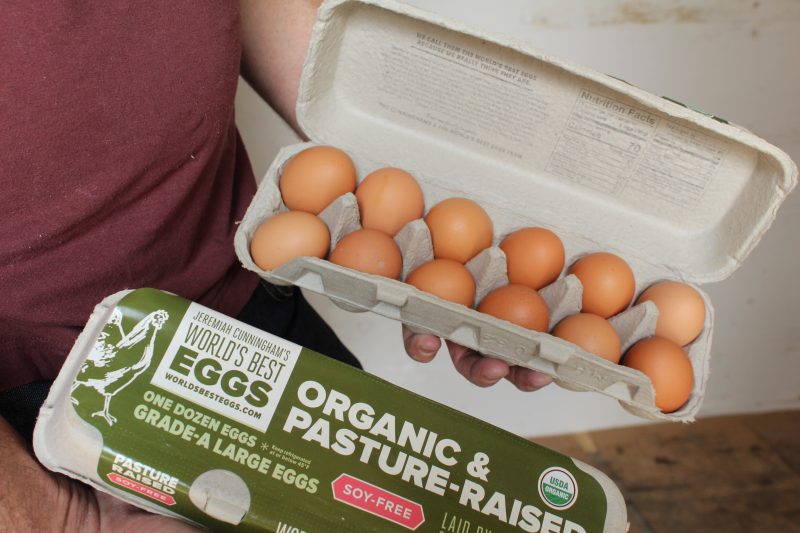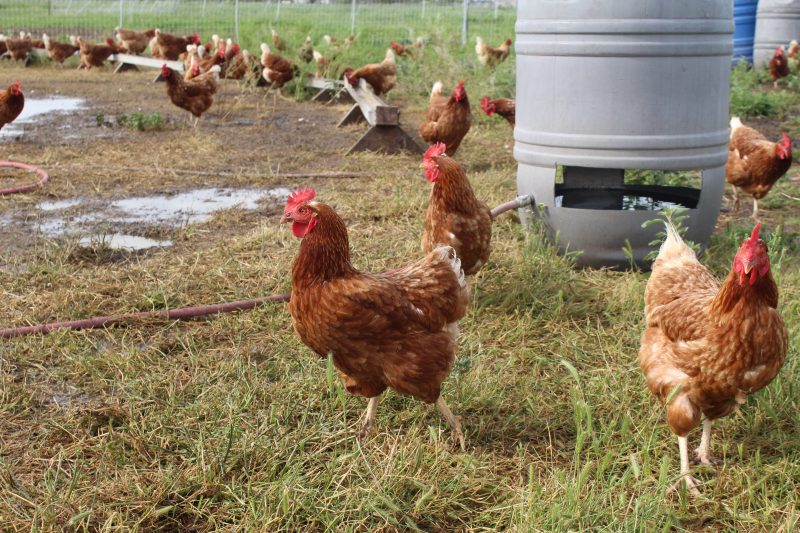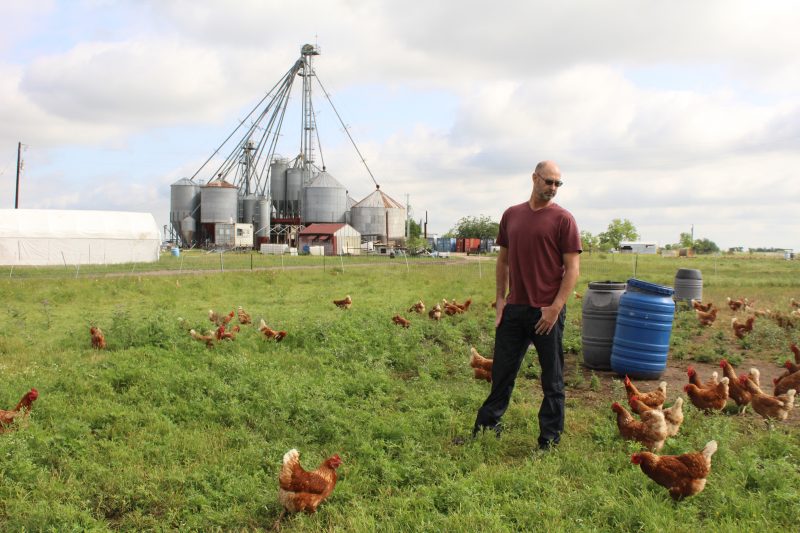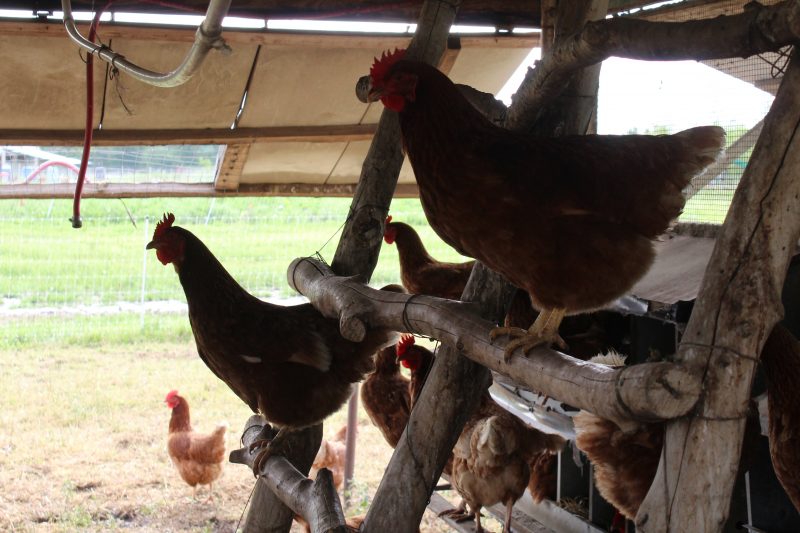A Senate Bill Could Crack Open Opportunities for Egg Farmers
By Ana Paola Davila Chalita
Reporting Texas

Rob Cunningham holds cartons of Grade-A eggs produced at Coyote Creek Organic Farm. in Elgin, Texas. Because his eggs are graded, he can sell them to restaurants and grocery stores while farmers who don’t grade their eggs are limited to whom they can sell. Maya Wray/Reporting Texas
Egg farmer Todd Johnson, owner of Roo the Day Farm in Pearland, sells ungraded eggs — eggs which have not been checked for quality by a U.S. Department of Agriculture-trained grader. Texas only allows ungraded eggs to be sold at farmers’ markets or directly to customers, as opposed to being sold in grocery stores.
To sell to grocery stores, Texas law requires egg producers to comply with USDA egg grading standards, which includes sizing, quality and cleanliness. Eggs are graded either AA, A or B. Eggs with the top rating, AA, have smooth shells, firm yolks and clear and thick whites. Eggs with the lowest rating, B, often have slightly stained shells, abnormal shapes and thin and watery whites.
Johnson’s Chicken’s produce more eggs than he can sell, he said, forcing him to throw away many dozens of eggs each month. If the Texas law which limits his options for selling ungraded eggs wasn’t in effect, Johnson is confident he wouldn’t be forced to discard so many eggs.

Egg-laying hens roam the pastures at Coyote Creek Organic Farm in Elgin, Texas. Maya Wray/Reporting Texas
Several states, including Missouri, Pennsylvania and Wisconsin, allow ungraded eggs to be sold to restaurants and grocers, according to the nonprofit group National Egg Regulatory Officials, which advocates for the egg industry in the U.S.
Sen. Nathan Johnson, D-Dallas, wants Texas to join those states. Senate Bill 481, authored by Nathan Johnson, would allow farmers to sell their ungraded eggs directly to businesses such as restaurants and grocers.
The Texas Department of Agriculture inspects eggs at packing plants, distribution centers and retail outlets to ensure USDA grading standards regulations are being followed. The shell quality is evaluated through observation, while interior quality involves candling (using a bright light behind the egg to show details through the shell).

Rob Cunningham, owner of Coyote Creek Organic Farm, surveys a field of his chickens in Elgin, Texas. To sell graded eggs, he must go through a more rigorous process than farmers who sell ungraded eggs. Maya Wray/Reporting Texas
Farmers who want to grade their eggs have to go through the meticulous process by themselves or buy an electric machine with a laser eye which can correctly grade the eggs for them. The machines can be up to $3,000 for a small machine grading 4,000 eggs per hour.
Small farmers with fewer than 3,000 hens are exempt from these standards but prohibited from selling their ungraded eggs to restaurants and grocers.
Todd Johnson recently received an offer to become a supplier for a Houston restaurant, but couldn’t accept because it would have been illegal, “If you don’t have the machines that [grade eggs],” Todd Johnson said, “it would take way too much time to grade the eggs.”
Judith McGeary is the executive director of the Farm and Ranch Freedom Alliance, a national organization that advocates for policies that help farmers and consumers rebuild a resilient local food system. McGeary calls Nathan Johnson’s egg bill a “common sense” solution.
Under the measure, egg cartons must have the word “ungraded” on them, and the farmer’s contact information.
Farmers who sell their produce at a farmers market already have labels with the necessary information, McGreary said. “They can take those exact same eggs and label them the exact same way and sell them at the local grocer or small restaurant.”
Large-scale egg producers aren’t fans of the bill, Mcgeary. Large-scale producers are able to invest in technology, sell to the larger grocers like HEB, and don’t want increased competition.
Amy Gallo, the Farm Vitality Director at the Sustainable Food Center, says it makes sense that large egg producers wouldn’t support SB 481. “They don’t want to share that market share with smaller farmers and ranchers,” Gallo said.
Theoretically all eggs, regardless of grade, are safe to eat. Eggs fall under the authority of the Federal Food Drug and Cosmetic Act, which prohibits the distribution of foods that are deleterious to humans, USDA Spokesperson Michelle Person told Reporting Texas. The USDA also has food safety regulatory oversight for shell eggs, Person added.
In order to be sold, all ungraded eggs have to be kept cold and washed in accordance with Texas Department of State Health Services regulations. Egg grading doesn’t pay a role in preventing the spread of avian flu, experts say.
The egg industry has faced challenges in recent years due to the avian flu, a virus that affects birds such as chickens and turkeys. The virus can cause high mortality rates among infected birds and has led to a significant decrease in the production of eggs.
The avian flu has contributed to an egg shortage, which has caused prices to increase and has made it challenging for consumers to find eggs at grocery stores and restaurants.
Retail egg prices rose by 8.5% in January 2023 and are now more than 70% higher than in January 2022, according to the USDA. Egg prices are predicted to increase by almost 38% in 2023.
Small farmers such as Todd Johnson haven’t had a big problem with avian influenza primarily because their hens are in an open space, separated by fencing and kept in smaller flocks, rather than in a crowded space with little access to green areas like big egg producers, Gallo said.
As a result, their birds are not as easily infected with the flu and their prices have not gone up as much as large corporations. A dozen eggs at Roo the Day Farms costs $5.
Egg farmer Steve Smith, the owner of Smith Pastures in Devine, has been selling ungraded eggs since 2018.
“The way that we raised ours [avian flu] doesn’t happen,” Smith said.
Smith’s hens are free range and fed with GMO-free soil. In the past, his eggs typically have cost more than those from the big egg producers, but the recent spike in egg costs has made prices more similar.

There is a growing demand for organically grown eggs laid by hens such as these at Coyote Creek Organic Farm. Maya Wray/Reporting Texas
“There’s absolutely a demand [for free range-eggs] by the consumers, by the local small grocers and by the chefs if they were given the opportunity,” McGeary said.
Even if SB 481 approval would not completely eradicate the egg shortage, it would build a more resilient food system by helping farmers who are already selling eggs, McGeary said.
It would also encouraged more farmers to enter the business by having more “realistic, meaningful, market opportunities,” she added
The bill would increase sales for farmers such as Todd Johnson, as it could help them have a set business that they could sell to.
“It would resolve in much less wastage of our eggs,” Todd Johnson said.